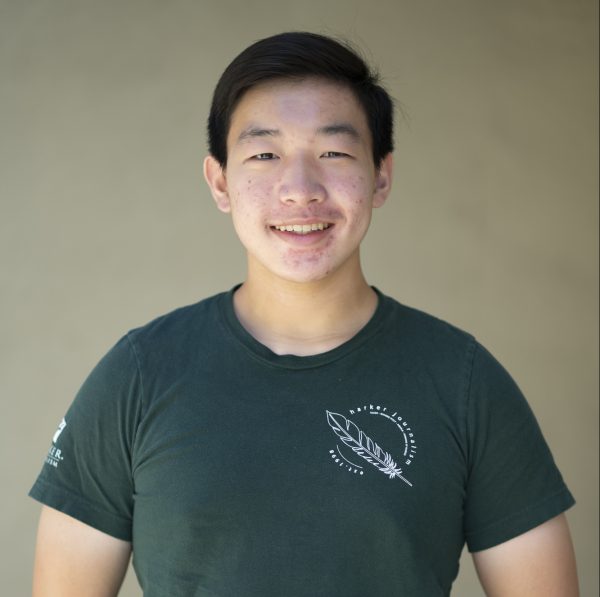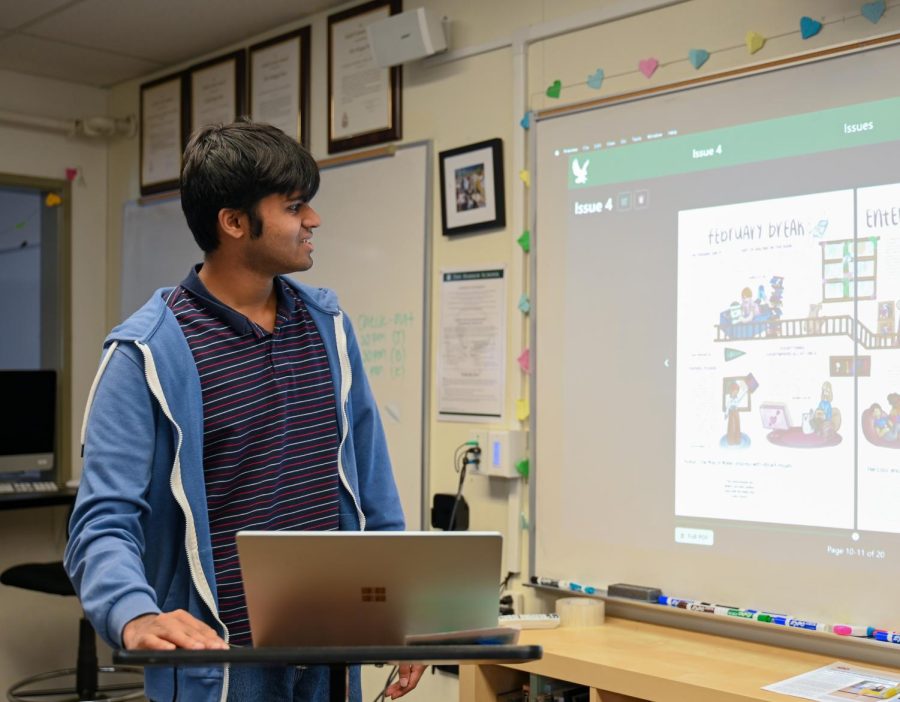Humans of Harker: Solutions through software
Arjun Barrett uses computer programming and journalism to give back to the community
“Programming always has an impact — you can do things that you never thought were possible. You don’t have to spend your time programming just to look more appealing to some job or college. You can do it because it actually makes the world a better place,” Arjun Barrett (12) said.
From Spanish conjugation tools to mobile scanner apps to data compression libraries, Arjun Barrett’s (12) coding abilities know no bounds. While the term “code” usually invokes images of hours-long competitions and exhaustive memorization of algorithms, Arjun sees programming as a means of leveraging the limitless potential of software to solve real-world problems.
As early on as middle school, Arjun gravitated towards coding projects that served a practical purpose. He recognized the potential of programming to help others, even in simple school assignments. Motivated by this insight, he dedicated himself to developing open source software that could benefit others.
“In eighth grade, I coded a Spanish conjugation tool with some friends to help study for classes,” Arjun said. “From there, I noticed how much we were using other people’s code, so I started writing my own code and putting it online for free. Since then, I’ve started creating open source code consistently and keeping at it.”
Whenever Arjun saw a problem to be fixed or a job to be accomplished, he always turned to coding because of its consistent, logic-based nature. For Arjun, being able to complete tasks with ease through the medium of programming became his driving force to pursue the subject further.
“I like the logic and structure that [code] provides,” Arjun said. “For me, it’s the easiest way to create something that can both help me in my everyday life or other people who decide to use my code.”
Gradually, Arjun began applying his programming skills to large-scale projects and broadcasting his creations to larger audiences. After taking issue with CamScanner’s watermark and how the app handles user data, Arjun programmed his own functional version of the app in less than two months, revealing to himself the power of programming in addressing everyday challenges.
Upper school mathematics teacher Dr. Victor Adler observed Arjun’s process of developing an alternative to CamScanner and commended his aptitude for learning.
“Arjun always asks really compelling questions, and he’s willing to do some considerable outside research on his part,” Dr. Adler said. “When he showed me his version of the CamScanner app, I was like ‘Oh wow, that’s awesome.’”
Close friend Kabir Ramzan (11) also noted Arjun’s focus and attention to detail when it comes to creating open source software. It was this focus that allowed him to turn a file decompression program meant just for the video game Geometry Dash into FFlate, a program that boasted over 70 million downloads on Github and was used by companies like NASA and Google.
“Arjun is able to take very obscure or unknown concepts and really delve into that and build something super powerful out of it,” Kabir said. “He made an entire compression library from scratch, and it got really popular on Github. He did a ton of work pursuing these niche fields; he finds specific items and just pursues them in depth.”
Despite encountering countless bugs in his code and bearing the responsibility of perfecting his programs for public use, Arjun remained motivated by viewing coding as a hobby and a means of helping others. This mindset allowed him to stay committed to his ventures every step of the way, transforming them from small passion projects to tools that impacted the world for the better.
“Programming always has an impact — you can do things that you never thought were possible,” Arjun said. “You don’t have to spend your time programming just to look more appealing to some job or college. You can do it because it actually makes the world a better place.”
Outside of coding, Arjun brings the same qualities of commitment and benevolence to journalism, a field he considers the complete opposite of programming. Although acclimating to the demands of journalism was difficult for Arjun at first, he gradually grew to appreciate the platform journalism provides to write about technology and other STEM topics.
Winged Post Co-Editor-in-Chief Sabrina Zhu (12), who works closely with Arjun in journalism, appreciates his maturity and sense of responsibility.
“Arjun’s always on top of his stuff, and he puts in a ton of time and effort into his articles,” Sabrina said. “It’s something that I don’t really see a lot in other reporters. In general, he’s super good at just helping out whenever he can and always looking for ways to improve.”
Now a managing editor for Aquila and Winged Post, Arjun has found a way to thrive in a field that once seemed so unfamiliar to him. Overcoming the disparity between coding and journalism, Arjun manages to bring his devotion and enthusiasm to both, finding ways to serve his peers in acts large or small.
“Even though I enjoy problems where you have a fixed solution with structure and logic, journalism is the polar opposite of that,” Arjun said. “It’s free flowing, and you have to find your own path and explore to create the best article. Doing journalism has helped me see that it can be just as fun an experience as structure and reasoning.”

Edward Huang (12) is a co-managing editor for the Winged Post, and this is his fourth year on staff. This year, Edward wants to continue creating unique...
Tiffany Chang (12) is the editor-in-chief of Humans of Harker, and this is her fourth year on staff. She’s looking forward to telling the story of the...


















![“[Building nerf blasters] became this outlet of creativity for me that hasn't been matched by anything else. The process [of] making a build complete to your desire is such a painstakingly difficult process, but I've had to learn from [the skills needed from] soldering to proper painting. There's so many different options for everything, if you think about it, it exists. The best part is [that] if it doesn't exist, you can build it yourself," Ishaan Parate said.](https://harkeraquila.com/wp-content/uploads/2022/08/DSC_8149-900x604.jpg)




![“When I came into high school, I was ready to be a follower. But DECA was a game changer for me. It helped me overcome my fear of public speaking, and it's played such a major role in who I've become today. To be able to successfully lead a chapter of 150 students, an officer team and be one of the upperclassmen I once really admired is something I'm [really] proud of,” Anvitha Tummala ('21) said.](https://harkeraquila.com/wp-content/uploads/2021/07/Screen-Shot-2021-07-25-at-9.50.05-AM-900x594.png)







![“I think getting up in the morning and having a sense of purpose [is exciting]. I think without a certain amount of drive, life is kind of obsolete and mundane, and I think having that every single day is what makes each day unique and kind of makes life exciting,” Neymika Jain (12) said.](https://harkeraquila.com/wp-content/uploads/2017/06/Screen-Shot-2017-06-03-at-4.54.16-PM.png)








![“My slogan is ‘slow feet, don’t eat, and I’m hungry.’ You need to run fast to get where you are–you aren't going to get those championships if you aren't fast,” Angel Cervantes (12) said. “I want to do well in school on my tests and in track and win championships for my team. I live by that, [and] I can do that anywhere: in the classroom or on the field.”](https://harkeraquila.com/wp-content/uploads/2018/06/DSC5146-900x601.jpg)
![“[Volleyball has] taught me how to fall correctly, and another thing it taught is that you don’t have to be the best at something to be good at it. If you just hit the ball in a smart way, then it still scores points and you’re good at it. You could be a background player and still make a much bigger impact on the team than you would think,” Anya Gert (’20) said.](https://harkeraquila.com/wp-content/uploads/2020/06/AnnaGert_JinTuan_HoHPhotoEdited-600x900.jpeg)

![“I'm not nearly there yet, but [my confidence has] definitely been getting better since I was pretty shy and timid coming into Harker my freshman year. I know that there's a lot of people that are really confident in what they do, and I really admire them. Everyone's so driven and that has really pushed me to kind of try to find my own place in high school and be more confident,” Alyssa Huang (’20) said.](https://harkeraquila.com/wp-content/uploads/2020/06/AlyssaHuang_EmilyChen_HoHPhoto-900x749.jpeg)



